satellite
Latest
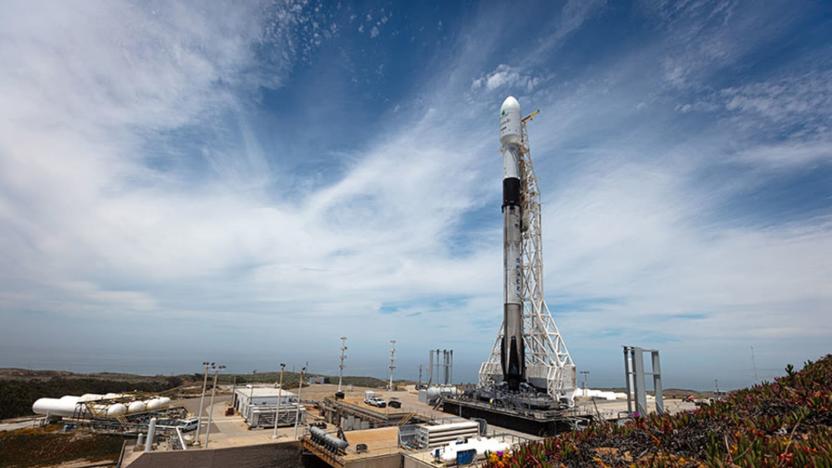
Watch SpaceX launch Earth observation satellites at 10:17AM ET
SpaceX is about to get your morning started in dramatic fashion (if you're in the Americas, that is). The private spaceflight outfit plans to launch Canada's RADARSAT Constellation Mission as soon as 10:17AM Eastern, with the satellites deploying in earnest 54 minutes after blastoff. The company is using the same Falcon 9 first stage that put the Crew Dragon demonstration mission into orbit back in March, and it expects to land the rocket at Vandenberg Air Force Base.

China launches a rocket from a ship for the first time
China has joined the US and Russia as the only nations to have successfully launched a rocket at sea. The National Space Administration's Long March 11 took off from a launchpad on a ship in the Yellow Sea today. The rocket carried five commercial satellites (including two for a company that plans to set up a global network of internet satellites) and two research-focused experimental ones.

Most of SpaceX's Starlink internet satellites are already on track
The first batch of 60 Starlink internet satellites has been orbiting Earth for about a week, and now SpaceX has released a status update on the mission. According to a spokesperson, "all 60 satellites have deployed their solar arrays successfully, generated positive power and communicated with our ground stations." The statement didn't directly mention concerns by astronomers about their brightness and visibility, but Elon Musk already has, and they aren't expected to reach their full altitude for three to four weeks. According to SpaceX, "observability of the Starlink satellites is dramatically reduced as they raise orbit to greater distance and orient themselves with the phased array antennas toward Earth and their solar arrays behind the body of the satellite." Parabolic Arc notes that during a speech at MIT this week, SpaceX president Gwynne Shotwell mentioned four of the units had unspecified problems, while today's update said "most" are using their Hall thrusters to reach operational altitude and have already made contact with their broadband antennas, but all of them have maneuvering capability to avoid each other and other objects.
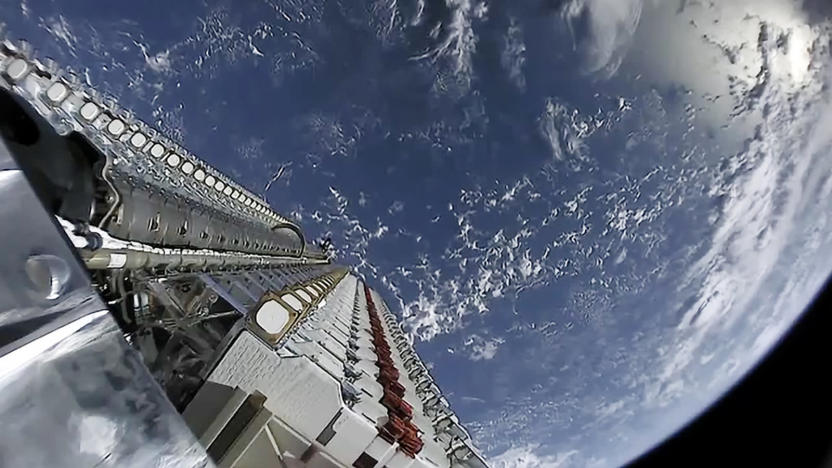
SpaceX's internet satellites could be a problem for astronomers
As helpful as SpaceX's Starlink satellites may be, they could be a pain for astronomers. The Harvard-Smithsonian Center's Jonathan McDowell and others have observed that the internet satellites are bright enough to cause a "problem" for astronomy, and the eventual constellation of roughly 12,000 satellites could complicate humanity's view of the night sky. It would triple the number of satellites in orbit, CNET noted, forcing telescope operators to account for the objects.

SpaceX explains how its internet satellites will survive in orbit
Earlier this week Elon Musk gave us a sneak peek at Space X's Starlink internet satellites before they're propelled into orbit. We can already see that it's a bit of a squeeze for the 60 production satellites inside the Falcon 9 rocket faring, so we know they're pretty flat-pack. Now, SpaceX has revealed a little more about how they actually work.

Elon Musk shows SpaceX's first internet satellites ready for launch
This might be your best chance to get a peek at SpaceX's Starlink internet satellites before they're hurtled into orbit. Elon Musk has posted a photo (below) of the first 60 production satellites packed into the fairing of a Falcon 9 rocket ahead of their launch this coming week. As you can tell, the housing is stuffed to the gills -- Musk added that the satellites are "flat-packed," without the dispenser you might expect for some missions.

Airbus startup aims to make satellite imagery easier to use
Airbus might just make it easier to use the growing treasure trove of high-res satellite imagery. The aerospace giant has launched a space tech startup, UP42, that promises to make satellite (and drone) image data accessible to individuals and small shops. In addition to providing the imagery itself, the fledgling firm offers "ready-to-use" algorithms that can do everything from detecting clouds to revealing changes like new buildings and shrinking forests. You wouldn't have to bend over backward to use overhead photography in an app, even you're on a relatively tiny budget.
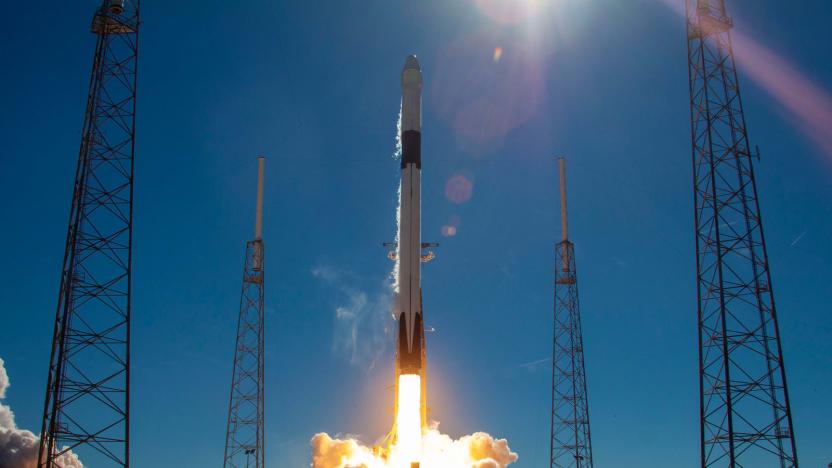
FCC clears SpaceX to fly internet satellites in lower orbit
SpaceX is one step closer to fulfilling its plans of launching a host of internet satellites. The FCC has approved its revised plan that would fly over 1,500 of its Starlink satellites at a lower orbit of 'just' 550km (about 342 miles). The move clears the path for an initial Starlink launch "no earlier than" May, the company said. Theoretically, the lower flight path allows coverage with fewer satellites, lowers latency and reduces the chances of space debris.
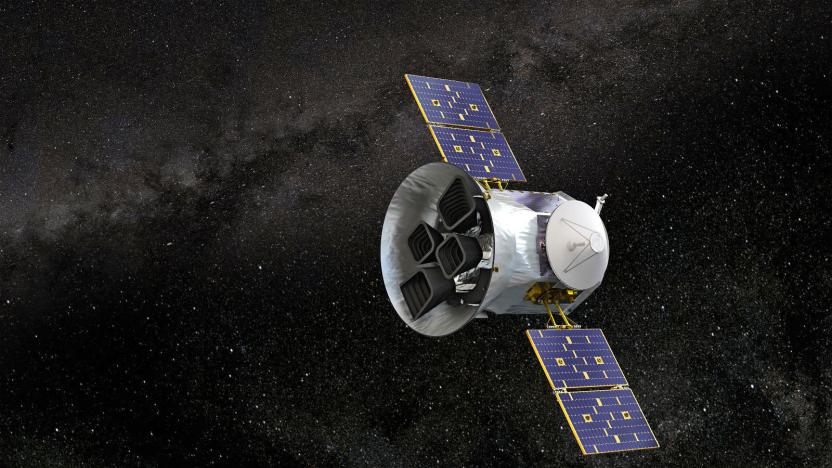
NASA’s TESS spacecraft finds its first Earth-sized exoplanet
One year after its launch, NASA's TESS (Transiting Exoplanet Survey Satellite) discovered its first Earth-sized exoplanet. Named HD21749c, the planet orbits a star just 53 light-years from Earth and is likely rocky but uninhabitable. The findings -- published in Astrophysical Journal Letters -- suggest TESS is capable of fulfilling its mission to catalog thousands of planet candidates, including more than 300 that are expected to be Earth-sized and super-Earth-sized exoplanets.

Rocket Lab's Photon platform makes it easier to launch satellites
Rocket Lab isn't content with just carrying satellites into orbit... it wants to power the satellites, too. The company has unveiled a satellite platform, Photon, that handles much of the hard work. It looks simple, but it includes avionics, attitude control, data storage, propulsion and solar cell power in a package that can be customized for each mission. For the most part, Rocket Lab's partners will only have to worry about the payload, not the satellite keeping it in orbit.
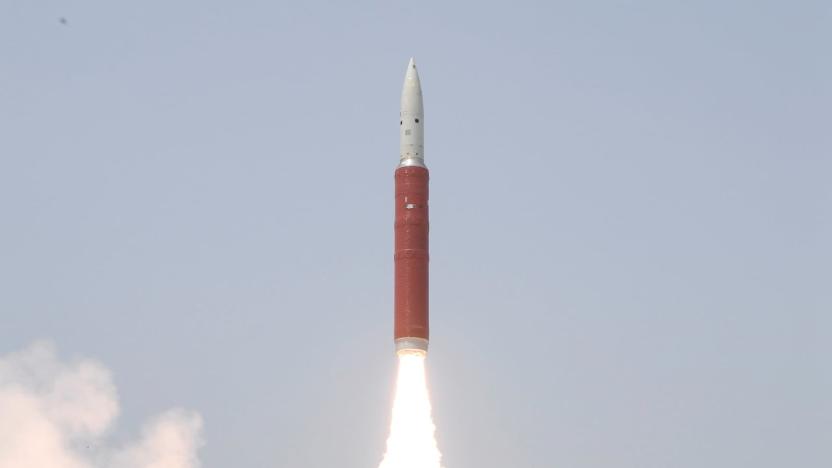
NASA says satellite that India shot down may threaten the ISS
NASA chief Jim Bridenstine called India's destruction of one of its satellites a "terrible, terrible thing" that could endanger astronauts aboard the International Space Station (ISS). Addressing employees, he said a missile that shot down a satellite created at least 400 pieces of orbital debris, including 60 larger than 6 inches in size. While the satellite was well below the ISS, 24 of the pieces were blasted above its apogee, creating a potential risk. "It's unacceptable and NASA needs to be very clear about what its impact to us is," Bridenstine said.

Streaming subscriptions overtook cable in 2018
Cable companies have been nervous about streaming services for a while, but now they have a particularly good reason to be jittery. An MPAA report citing IHS Markit data has shown that there were more subscriptions worldwide to online video services (613.3 million) than there were for cable (556 million) in 2018, reflecting a 27 percent jump in streaming over 2017. Cable subscriptions dropped two percent in that period. IP-based TV overtook satellite, too, indicating a larger overall shift to the digital realm.

Watch OneWeb launch its first 5G satellites into space at 4:37PM ET
After a number of delays, US-based communications company OneWeb is finally ready to launch its first batch of satellites that will provide internet access to rural regions around the world. The company's first launch will take place Wednesday when a Soyuz rocket operated by Arianespace blasts off from the Guiana Space Center carrying six OneWeb satellites. The launch is set to take place at 1:37PM PT/4:37PM ET and will be livestreamed on OneWeb's website or on Arianespace's YouTube channel.

NASA's free interactive photo book shows the abstract beauty of Earth
NASA just released 168 pages of stunning images showing the planet's atmosphere, water, land, ice and snow from a satellite's perspective. For $53, you can buy a hardcover version of the book, simply titled Earth. Or you can accept the unavoidable truth that print is dead and enjoy the free, interactive online version on NASA's Earth Observatory. And if you absolutely must take the book with you, there are free PDF and ebook versions too.
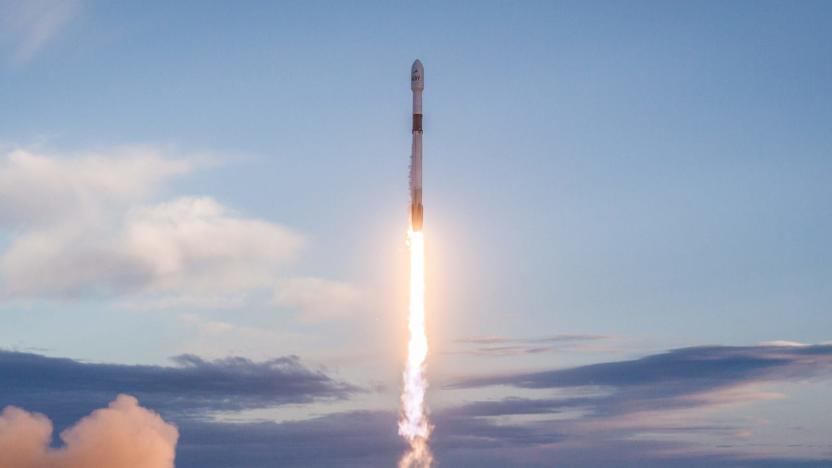
Iridium's 'truly global' satellite internet connects aircraft and ships
Wondering what Iridium would be doing with those Next satellites that SpaceX just finished launching? You now have an idea. Iridium has formally debuted Certus, a "truly global" satellite broadband service that promises to keep aircraft, ships and other vehicles (including self-driving vehicles) connected even in the remotest places. It's far from fast at 352Kbps for both downloads and uploads, but that's enough to keep crews online and provide reasonably high-quality voice services.
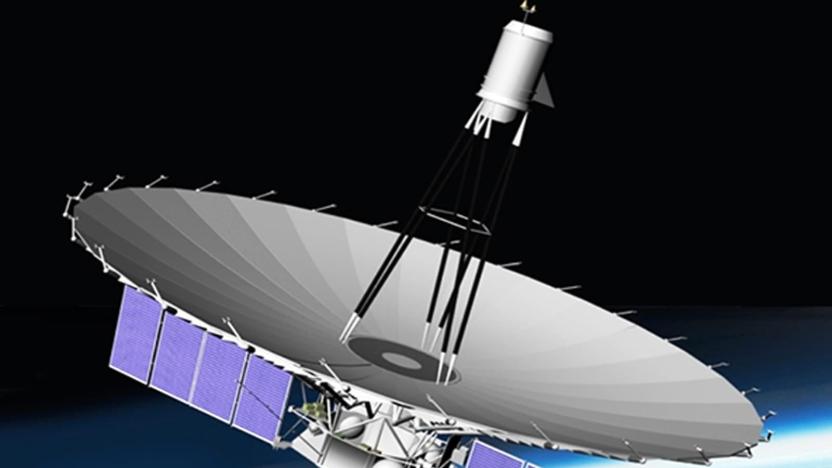
Russia lost control of an orbiting radio telescope (updated)
Russia's astronomy program is facing a significant setback. The country's orbital Spektr-R radio telescope has stopped responding to commands since January 11th. While it's still transmitting signals, the satellite effectively can't be used for future tasks in its current state. The space agency Roscosmos said it would next try to regain control and fix issues on January 13th at 2PM Moscow time (6AM Eastern), but it's not clear what would happen after that.

Researchers propose guiding large space telescopes with tiny satellites
Using the recently retired Kepler space telescope, scientists have confirmed thousands of exoplanets, and as its successor TESS ramps up its search, we're poised to discover plenty more. But once we find exoplanets, learning more detailed information about them requires larger, more powerful space telescopes. These telescopes would need very large mirrors, much like NASA's upcoming (and continuously delayed) James Webb Telescope, which will use its 6.5-meter-wide mirror to observe extremely distant galaxies. And like the James Webb Telescope, they very well could have a mirror made up of many individual segments -- Webb's has 18.
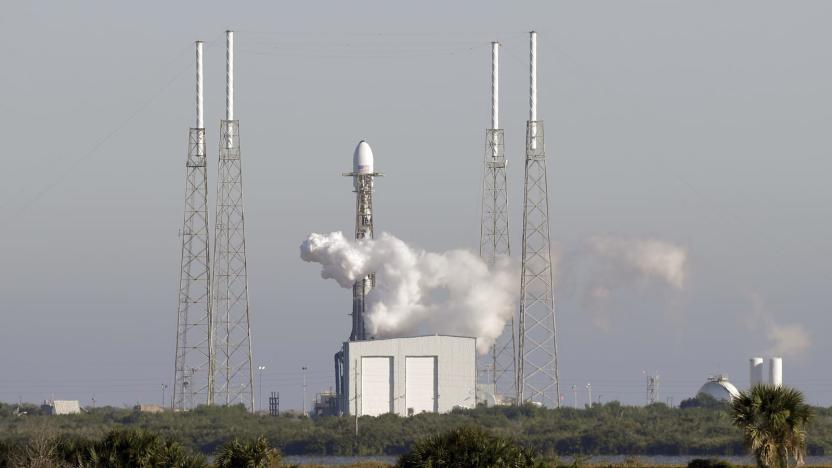
SpaceX completes its first US national security mission
SpaceX managed to squeak in one more milestone before the end of 2018. The private spaceflight company successfully launched its first-ever US national security mission, carrying the US Air Force's equally new GPS III satellite into orbit. The effort was comparatively messy as far as recent SpaceX launches go. The company delayed the launch multiple times over the past several days, and the Air Force's performance margin requirements ruled out a landing for the Falcon 9 rocket's first stage.

Swarm to pay $900,000 for unauthorized satellite launch
The FCC announced today that it had reached a settlement with Swarm over the startup's unauthorized satellite launch in 2017. The trouble started in December of last year when the FCC denied Swarm a licence to launch a set of small satellites called SpaceBEEs, with the commission claiming the satellites were too small to be reliably tracked. But Swarm launched them anyway in January and once the FCC got wind, it initiated an investigation. The settlement requires Swarm to pay a $900,000 penalty and submit to extended FCC oversight over the next few years.

Rocket Lab launches NASA's first dedicated cubesat mission
Rocket Lab isn't quite done establishing firsts. The company has successfully launched ElaNa-19 (Educational Launch of Nanosatellites), NASA's first cubesat mission to get a dedicated ride to space. Until now, the agency's tiny satellites have piggybacked on missions carrying larger payloads. It's also the first Venture Class Launch Services mission for the company, and the first time Rocket Lab has conducted two launches that are relatively close together. Its initial commercial flight, "It's Business Time," lifted off five weeks ago.







